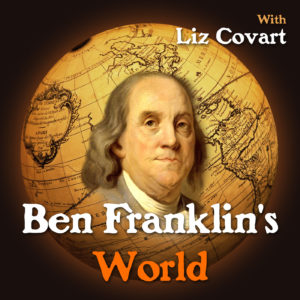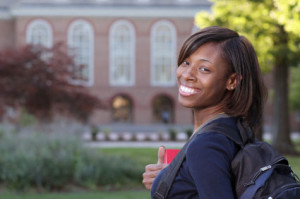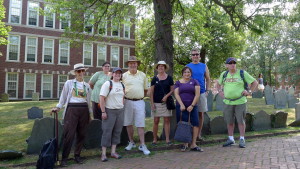How I Select Guests for Ben Franklin’s World
 Believe it or not (I can’t), Ben Franklin’s World will celebrate its first birthday on October 7, 2015. The podcast started as an experiment to answer questions: Could a podcast help historians restore history to the forefront of the public mind? Were non-historians interested in learning more about high-quality, well-researched history?
Believe it or not (I can’t), Ben Franklin’s World will celebrate its first birthday on October 7, 2015. The podcast started as an experiment to answer questions: Could a podcast help historians restore history to the forefront of the public mind? Were non-historians interested in learning more about high-quality, well-researched history?
The experiment soft launched on October 7, 2014 when I posted the first 4 episodes on benfranklinsworld.com. On December 2, 2014, the show hard launched in iTunes. By February 2015, listener engagement and statistics for the podcast indicated that the answer to my questions was “yes.”
Today, Ben Franklin's World has released 47 episodes. Listeners have downloaded the show more than 295,000 times.
Over the next several weeks, I intend to share lessons I have learned about podcasting, interviewing, and being a digital historian.
In this post, I will answer a question I get asked a lot: How do I select guest historians for the show?
Guest Historians: The Early Days
The first guest historians on Ben Franklin's World represent historians I either knew and/or who had books I wanted to read or historic sites I wanted to learn more about. I also asked historians who worked on topics that my "podcast avatar" wanted to explore.
A "podcast avatar" assists podcasters like an "ideal reader" helps writers. In both cases, a fictional person stands in for the ideal audience member a podcaster or writer wants to reach.
I created an avatar who is hard to please: Janet Watkins. Janet isn't into history. She's a 22-year-old pre-med student at SUNY-Buffalo. She wants to fill her schedule with math and science courses, but she ended up in a history course that assigns Ben Franklin's World episodes because SUNY requires all students to take several Liberal Arts classes before they graduate. Janet is a good student so she decides to brace herself for the inevitable: another boring history course that discusses dead white men. As an African American woman, she long ago grew tired of how her primary and secondary school history courses always seemed to focus on the lives of elite, white men.
My challenge: How do I reach Janet and change her mind about history? How can I show her that the study of history has as much value as the study of science and math?
Janet is fictional, but I still like to think that if I have done my job right, Janet (or someone like her) will get caught in the student clinic supply closet listening to Ben Franklin’s World when she is at her work-study job.
The Ben Franklin's World Audience
Janet Watkins has been a helpful podcast avatar. She has, and does, serve me well. However, I find I need to use her a bit less these days as Ben Franklin's World has an audience.
Ben Franklin's World listeners reach out several times a week to tell me what they want to know more about. They have given me a lengthy list of subjects, but their most requested topic: Everyday life.
Today, I try to make every decision about whom to invite as a guest or which pitches to accept with the Ben Franklin's World audience in mind. If I am interested in a book or historic site, but can’t get a clear read on how the audience might feel about it, I think about my podcast avatar and whether she would be interested in an episode about the topic.
I also think about geography and period. I take a liberal view of what periods and geographies constitute "Ben Franklin's world." In essence, the podcast covers the first half of a college-level United States History survey course. I start my survey before 1492 and discuss the peoples and nations who inhabited or interacted with the North American continent until about 1865.
Listener engagement increases when Ben Franklin's World investigates the history of a listener's home region. To this end, I plan to include more North American regions in 2016.
Finally, I would be remiss if I didn't acknowledge the role my own historical interests play in my decision-making process. My interests play a role, but I couldn't tell you how much of a role they play. I am sure they played a greater role during the first few months of the show than they do now. Today, when I find a topic that interests me, I compare it to my listener requests list and to my geographic and period needs. If I am on the fence, I think about my avatar. I try not to let my interests supersede those of the audience.
Conclusion
Listeners, podcast avatar, period and geography, these are the people and aspects I consider when I invite a guests on the show. If you would like more information about being a guest please check out the show's guest information page.

